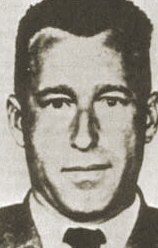The
Austrian Franz Stangl was in charge of Sobibor until
September 1942, when he was transferred to the
deathcamp Treblinka. Stangl gained a reputation as an
efficient administrator and according to
SS-Obergruppenfuehrer Odilo Globocnik, Franz Stangl
was "the best camp commander, who had the
greatest share of the entire action...."

At
the end of the war Franz Stangl managed to conceal his
identity and although imprisoned in 1945 he was
released two years later. He
escaped to Italy with his colleague from Sobibor,
Gustav Wagner, where he was helped by the Vatican
network to Syria on a Red Cross passport. Stangl
was joined by his wife and family and lived in Syria
for three years before moving to Brazil in 1951. With
the help of friends Stangl found work at the
Volkswagen plant in Sao Paulo, still using his own
name.
For
years his responsibility in the mass murder of men,
women and children had been known to the Austrian
authorities but Austria did not issue a warrant for
Stangl's arrest until 1961. It took another six years
before he was tracked down by Nazi hunter Simon
Wiesenthal and arrested in Brazil.
After
extradition to West Germany he was tried for the
deaths of around 900,000 people. He admitted to these
killings but argued:"My conscience is clear. I
was simply doing my duty .." Found guilty on
22 October, 1970, Stangl was sentenced to life
imprisonment. He died of
heart failure in Düsseldorf prison on 28 June, 1971.
Franz
Stangl was interviewed by the author Gitta Sereny in
1970 and his comments later appeared in the book Into
That Darkness: An Examination of Conscience (1983):
"Would
it be true to say that you got used to the
liquidations?"
He
thought for a moment. "To tell the truth,"
be then said, slowly and thoughtfully, "one did
become used to it."
"In
days? Weeks? Months?"
"Months.
It was months before I could look one of them in the
eye. I repressed it all by trying to create a special
place: gardens, new barracks, new kitchens, new
everything; barbers, tailors, shoemakers, carpenters.
There were hundreds of ways to take one's mind off it;
I used them all."
"Even
so, if you felt that strongly, there had to be times,
perhaps at night, in the dark, when you couldn't avoid
thinking about it?"
"In
the end, the only way to deal with it was to drink. I
took a large glass of brandy to bed with me each night
and I drank."
"I
think you are evading my question."
"No,
I don't mean to; of course, thoughts came. But I
forced them away. I made myself concentrate on work,
work and again work."
"Would
it be true to say that you finally felt they weren't
really human beings?"
"When
I was on a trip once, years later in Brazil," be
said, his face deeply concentrated, and obviously
reliving the experience, "my train stopped next
to a slaughterhouse. The cattle in the pens hearing
the noise of the train, trotted up to the fence and
stared at the train. They were very close to my window,
one crowding the other, looking at me through that
fence. I thought then, 'Look at this, this reminds me
of Poland; that's just how the people looked,
trustingly, just before they went into the
tins..."'
"You
said tins," I interrupted. "What do you mean?"
But he went on without hearing or answering me.
"...
I couldn't eat tinned meat after that. Those big eyes
which looked at me not knowing that in no time at all
they'd all be
dead." He paused. His face was drawn. At this
moment he looked old and worn and real.
"So
you didn't feel they were human beings?"
"Cargo,"
he said tonelessly. "They were cargo." He
raised and dropped his hand in a gesture of despair.
Both our voices had dropped. It was one of the few
times in those weeks of talks that he made no effort
to cloak his despair, and his hopeless grief allowed a
moment of sympathy.
"When
do you think you began to think of them as cargo? The
way you spoke earlier, of the day when you first came
to Treblinka, the horror you felt seeing the dead
bodies everywhere - they weren't 'cargo' to you then,
were they?"
"I
think it started the day I first saw the Totenlager in
Treblinka. I remember Wirth standing there, next to
the pits full of blue-black corpses. It had nothing to
do with humanity, it couldn't have; it was a mass - a
mass of rotting flesh. Wirth said, 'What shall we do
with this garbage?' I think unconsciously that started
me thinking of them as cargo."
"There
were so many children, did they ever make you think of
your children, of how you would feel in the position
of those parents?"
"No,"
he said slowly, "I can't say I ever thought that
way." He paused. "You see," he then
continued, still speaking with this extreme
seriousness and obviously intent on finding a new
truth within himself, "I rarely saw them as
individuals. It was always a huge mass. I sometimes
stood on the wall and saw them in the tube. Bu t- how
can I explain it - they were naked, packed together,
running, being driven with whips like ..." the
sentence trailed off.
"Could you not have changed that?" I asked.
"In your position, could you not have stopped the
nakedness, the whips, the horror of the cattle
pens?"
"No,
no, no. This was the system. Wirth had invented it. It
worked and because it worked, it was
irreversible."